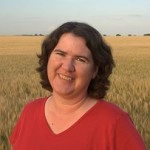Today we interview Becky McCray. I have known Becky since 2006 and she has always impressed me as an articulate and outspoken rural entrepreneur. She is also a sought after speaker, published author, but above all – a well known and die hard small business survivalist.
[Marco] Hi Becky. Thank you for taking the time to speak with us in this interview. Let me start by asking – how many businesses do you own?
[Becky] Hi, Marco. Thanks for inviting me, and letting me share some with your readers. My husband and I co-own a liquor store (Allen’s Retail Liquor) and cattle ranch here in Northwest Oklahoma. Then I speak and write about small town business. And I’m a co-founder of Tourism Currents, providing training to tourism professionals on social media marketing. So that’s four. I used to have five, so this is actually easier.
[Marco] Obviously, having multiple companies gives you the opportunity to have a diversified steam of income. But as a small business owner, it can also be hard to manage so many things at once. How do you divide your time among all your businesses?
[Becky] I am a big believer in having multiple sources of income! I divide my time based on projects. I keep a running list of all the projects between all the businesses. Then, once a week, I draw up my schedule with any appointments or set-time events. Then I put the different projects in around them. By reviewing my project list, I can keep things going in all the different worlds.
[Marco] Does having multiple businesses mean that you work very long hours, seven days a week? And how do you handle a business that has retail hours and needs a regular presence (including weekends) with your other companies?
[Becky] We have staff to work the counter at our store, so I’m not always there like I used to be in 2006. Now, a typical day starts with my husband and me setting up the liquor store for the day, making deposits, and all the things that come with a bricks and mortar store. Then we take care of any “in town” errands, picking up parts or feed for the farm, that sort of thing. Then I usually get in some time focused on my online work before lunch. Then the afternoon might include a trip to the farm to take care of cattle or fix a fence. Or I might spend the afternoon writing, preparing a talk, or holding a meeting online. In the odd minutes, I do connect a lot on Twitter. Since I work from home mostly, that’s my connection to the outside world. I’m trying to get better at not working seven days a week. I take most Saturdays off to do family or personal things.
[Marco] There seems to be little overlap among your companies. That is good, in the sense that your revenues are not tied to the fate of a single industry. But at the same time, it can be a marketing nightmare because you have to market each business differently. How do you market your businesses – and can you combine any of your marketing efforts?
[Becky] Well, the cattle go to the livestock auction, so there’s not any direct marketing in that. The liquor more or less markets itself. We do some social media, just to be friendly. But Tourism Currents and the small town business work have some overlap. Small towns and tourism go together well. I do my own online presence for small town business, and for Tourism Currents, Sheila Scarborough and Leslie McLellan maintain a huge online presence. These two do help feed each other.
[Marco] Speaking of marketing, as a rural entrepreneur, how do you address competition from large companies with national brands? For example, I assume that your liquor store has to deal with big box retailers who get big supplier discounts and have large marketing budgets. Are they a threat to your business? And if so, how do you compete?
[Becky] Interestingly, Oklahoma law is in our favor right now. The liquor wholesalers are required to sell to every store at the same price. But we do have to deal with our locals going to the big city to shop at the HUGE stores with big budgets there. We compete on convenience (we’re right here) and on our personal relationships (you know us).
[Marco] As an employer, how do you find qualified employees in a rural environment? And what do you do if you can’t find local talent?
[Becky] We’re in the middle of a local oil and gas boom, so our labor supply is even tighter than normal. We do a lot of networking, connecting individually to know who’s available when we need someone. Sometimes we hire from one of our nearby towns, even though it will be a long commute for them. One “hidden” source is the government department that works to help people with disabilities find jobs. People have all different kinds of disabilities, and most won’t interfere with what you really need in an employee.
[Marco] I love the fact that you work with the government to help disabled folks find meaningful jobs. Can you tell us more about that? Maybe some city folks can take this advice as well.
[Becky] I used to work for my local Workforce Council. It was a group of local employers, government agencies, and workers working together. Amazing experience. But now I’m aware of the enormous number of people who want to work, but just somehow don’t connect. So look around to your employment office, agency on aging, disability, what have you. Ask around. They’ll be glad, and you’ll be glad.
[Marco] What do you like the most about being a rural entrepreneur? And the least?
[Becky] I get to live where I want, and do what I love to do. I get to decide my own fate in a way that few people do. Let’s see. What’s the downside? Probably the occasional cash flow crunch, or maybe the distance to resources. I think it would be cool to have access to some of the things urban people take for granted.
[Marco] You mention that the occasional cash flow crunch is one of the downsides of being a rural entrepreneur. That is a problem that I personally see in businesses in every location. However, companies in larger cities have access to a variety of financial resources. What resources are available to rural entrepreneurs? How do they handle the inevitable cash flow problems?
[Becky] I solve that through long term savings. That is, having the cash set aside to be ready for crunches in the future. That’s a rural answer, because we don’t have as many resources, and because we tend to be extremely independent. I was raised around grandparents who would not borrow money. Would not. That’s probably a good influence.
[Editors note: I just love this answer! Both small and large businesses would be wise to follow Becky’s advice]
[Marco] Where do you see business and entrepreneurship in rural America five years from now? And ten?
[Becky] Within ten years, entrepreneurship will be the way the majority of rural people make a living. Overall, the rural economy is strong over the next 5 to 10 years, with food and natural resources being primary drivers of opportunity. There will be up and down spots, of course, but the national outlook is good. And today, most entrepreneurs are location-independent, so I think we’ll continue to see more folks move to rural areas to do business with lower cost and better quality of life.
[Marco] One last question. I know that you love travelling and have been to a number of places, including Africa and South America. Now, most business owners can barely take a week’s vacation. How do you pull it off?
[Becky] I make sure I’m not too important for anyone to live without for three weeks. Our staff at the store is quite capable. The speaking and writing doesn’t require me to be any place in particular (except of course when I’m speaking!), and Sheila and Leslie are actually the ones who make Tourism Currents work. So I guess that’s the advantage of not being a consultant or not being that important. The cattle are fairly self-sufficient in summer time; they graze the pasture on their own. We arrange for someone to check to be sure they have water. (Winter is tougher, so we don’t travel as often in winter.) What it really means is that I know I’m going to take time off. I build that fact into how I build my businesses.
About Becky McCray

